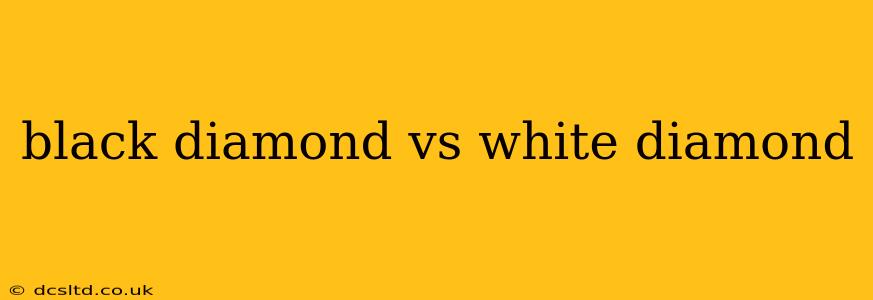Diamonds, symbols of enduring love and luxury, come in a dazzling array of colors. While white diamonds reign supreme in popularity, black diamonds offer a striking alternative, captivating with their mysterious allure. This comparison delves into the key differences between black and white diamonds, exploring factors like formation, appearance, price, and care.
What Makes a Diamond Black?
Unlike white diamonds that derive their sparkle from their crystal structure and the reflection of light, black diamonds owe their color to the presence of graphite inclusions. These tiny graphite particles, essentially tiny pieces of pure carbon, scatter light rather than reflecting it, resulting in the characteristic deep black hue. The concentration and distribution of these graphite inclusions determine the intensity and uniformity of the black color. Some black diamonds may exhibit subtle hints of other colors, adding to their unique character.
How Are White Diamonds Formed?
White diamonds, on the other hand, are formed under immense pressure and heat deep within the Earth's mantle. Their crystal structure, a highly ordered arrangement of carbon atoms, allows for the interaction of light that produces the brilliant sparkle we associate with white diamonds. The degree of clarity and "fire" (dispersion of light) depends on the absence of inclusions and other imperfections in the crystal lattice. Trace amounts of other elements can sometimes cause variations in color, leading to fancy colored diamonds.
What is the Difference in Appearance Between Black and White Diamonds?
This is perhaps the most obvious difference. White diamonds are known for their brilliant sparkle and fire, showcasing a wide spectrum of colors when light interacts with their facets. Black diamonds, while lacking the same level of brilliance, possess a unique depth and intensity. Their dark, sometimes subtly textured surface offers a more opaque and mysterious look. Instead of sparkle, black diamonds exude a sophisticated, almost velvety darkness.
Which Diamond is More Expensive?
Generally, high-quality white diamonds are more expensive than black diamonds of comparable carat weight. The consistent demand for white diamonds, their rarity (depending on size and clarity), and intricate cutting processes contribute to their higher value. However, exceptionally rare and well-formed black diamonds, especially those with unique patterns and intense color, can command high prices.
How Do I Care for Black vs. White Diamonds?
Both black and white diamonds are exceptionally durable gemstones, scoring a 10 on the Mohs Hardness Scale. This means they are resistant to scratches. However, both types require careful handling to avoid chipping or breakage. Regular cleaning with a soft brush and mild detergent is recommended for both. Avoid harsh chemicals and ultrasonic cleaners, as these could potentially damage the diamonds, especially black diamonds with inclusions.
Are Black Diamonds Real Diamonds?
Yes, black diamonds are indeed real diamonds. They are composed of the same carbon structure as white diamonds but possess different characteristics due to the presence of graphite inclusions. Their formation process is also similar, originating deep within the Earth.
What are the Different Types of Black Diamonds?
While white diamonds are categorized primarily by clarity, color, and cut, black diamonds can vary in the intensity and uniformity of their black color. Some black diamonds might exhibit subtle hints of gray, blue, or even green, adding complexity to their appearance. The presence and distribution of inclusions also contribute to the unique character of each black diamond.
Which Diamond is Right For Me?
The choice between a black diamond and a white diamond is entirely a matter of personal preference. White diamonds embody classic elegance and brilliance, while black diamonds offer a modern, edgy appeal. Consider your personal style, budget, and desired aesthetic when making your decision. Both types of diamonds can make stunning engagement rings, pendants, earrings, and other pieces of jewelry. Ultimately, the best diamond is the one that resonates most with you.
